Ancestry.com is one of the oldest platforms for genealogical research and at-home DNA testing. With only a saliva sample, it helps you discover fascinating insights like your ethnic origins, family history, and relative matches. It has helped many people develop a keen interest in genealogy products and services in the past decade.
With the rise in demand, there has been an increase in the number of services competing with Ancestry.com. Whether you’re looking for cheaper product options or more in-depth insights, you’ll have numerous services to consider. We’ve compiled a list of the top 5 Ancestry.com alternatives to help you choose the best service for genealogical DNA testing.
Why should you consider Ancestry.com alternatives?
Ancestry.com’s primary at-home DNA testing service is called AncestryDNA, which offers professional genealogy research and family tree building solutions. The service stands out in the industry because it has one of the largest databases — a whopping 60 billion personal and historical records — that adds to the accuracy and depth of your results.
Some of the platform’s key features include:
Interactive family tree building with options to add photos and birth certificates
Ethnicity estimates based on algorithms that cover 2,600+ regions
DNA matching to find relatives
Trait analysis
While Ancestry.com has helped many customers explore their roots, it has plenty of drawbacks. For instance, most of its interesting features and reports are add-ons that you need to pay for separately. Users have also listed problems such as difficulty navigating their results, technical glitches, and overwhelming notifications and ads.
One of the biggest drawbacks of Ancestry.com is that it has discontinued its AncestryHealth service — there aren’t many perks once you look past the basic genealogical data.
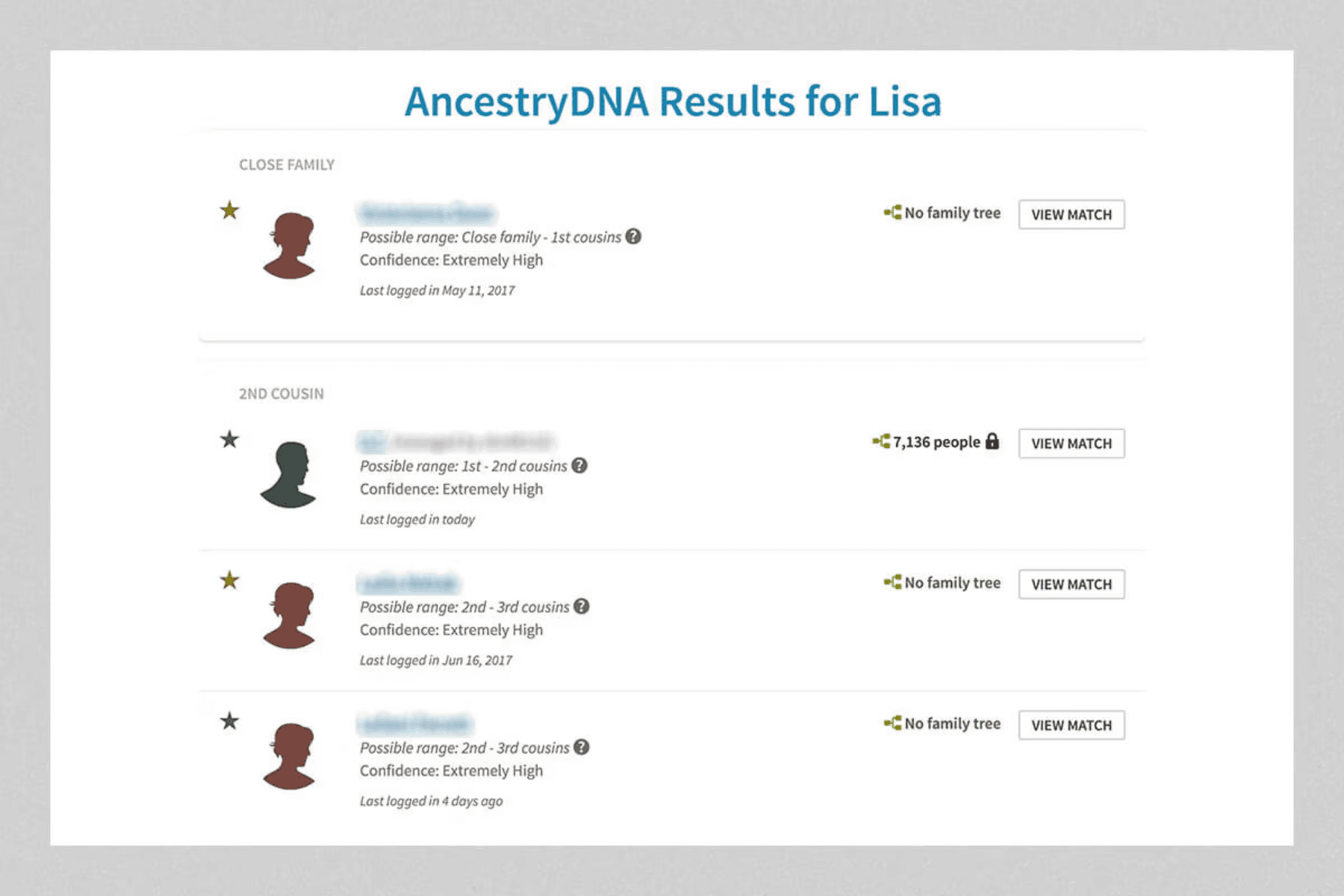
Source: Ancestry.com
5 alternatives to Ancestry.com worth checking out
While researching different services for this guide, we focused on options that offered similar or better ancestry insights compared to Ancestry.com. Here’s a basic overview of the services we’ll cover:
1. 23andMe
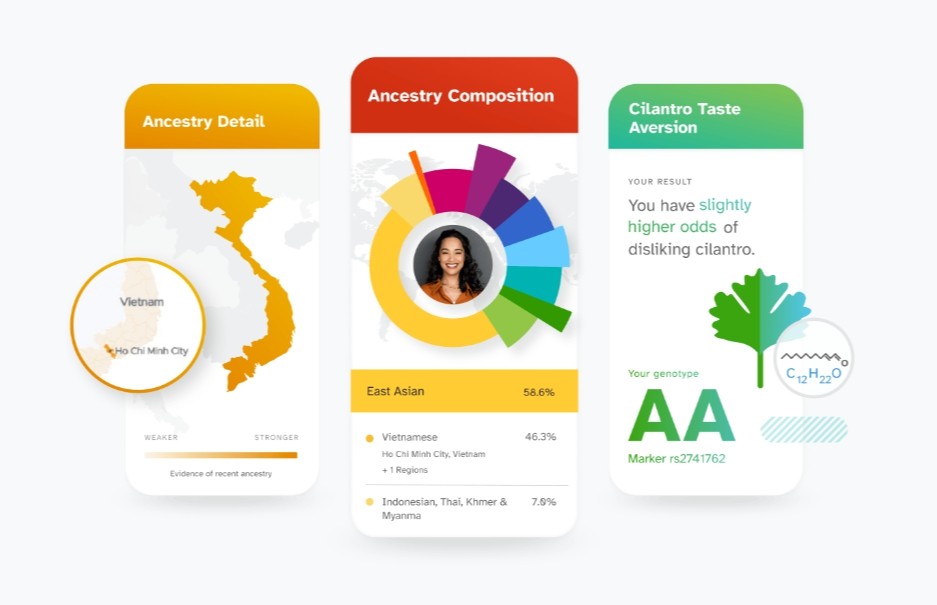
Source: 23andMe
23andMe stands shoulder to shoulder with Ancestry.com in terms of popularity. This DNA testing service has a Chromosome Painting feature that breaks down your ethnicity based on reference populations from over 3,000 regions. It also has a large user database, which implies that you find potential relatives and build family trees.
One feature that sets 23andMe apart from Ancestry is its haplogroup analysis, which reveals the migration pattern/timeline of your paternal and maternal ancestors as far back as eight generations. 23andMe’s ancestry analyses are generally accurate, especially on the continent level.
Besides ancestry reports, 23andMe offers health insights, such as your predispositions to health conditions and carrier genes for inheritable conditions. That said, these reports are incomplete and vague as the platform uses genotyping technology to read your data. Genotyping analyzes only 0.1% of your DNA, which is not enough to generate a comprehensive and clinically valid DNA health test.
As far as service quality is concerned, there have been some reports of 23andMe’s test results arriving late. It’s also worth noting that the 2023 data breach (that leaked the profiles of millions of users) has raised serious concerns about the company’s security measures.
Bonus read: Discover our top list of 23andMe alternatives.
23andMe pricing
Ancestry Service: $119
Health + Ancestry Service: $199
23andMe+ Premium: $199 (first year) + $69/year (renewals)
23andMe+ Total Health: $999 (first year) + $499/year (renewals)
23andMe pros and cons
ProsConsIn-depth ancestry reportsFamily trees and haplogroupsNear-accurate ethnicity estimatesFlexible pricing optionsLarge databaseExpensive annual plansIncomplete health insights
2. MyHeritage
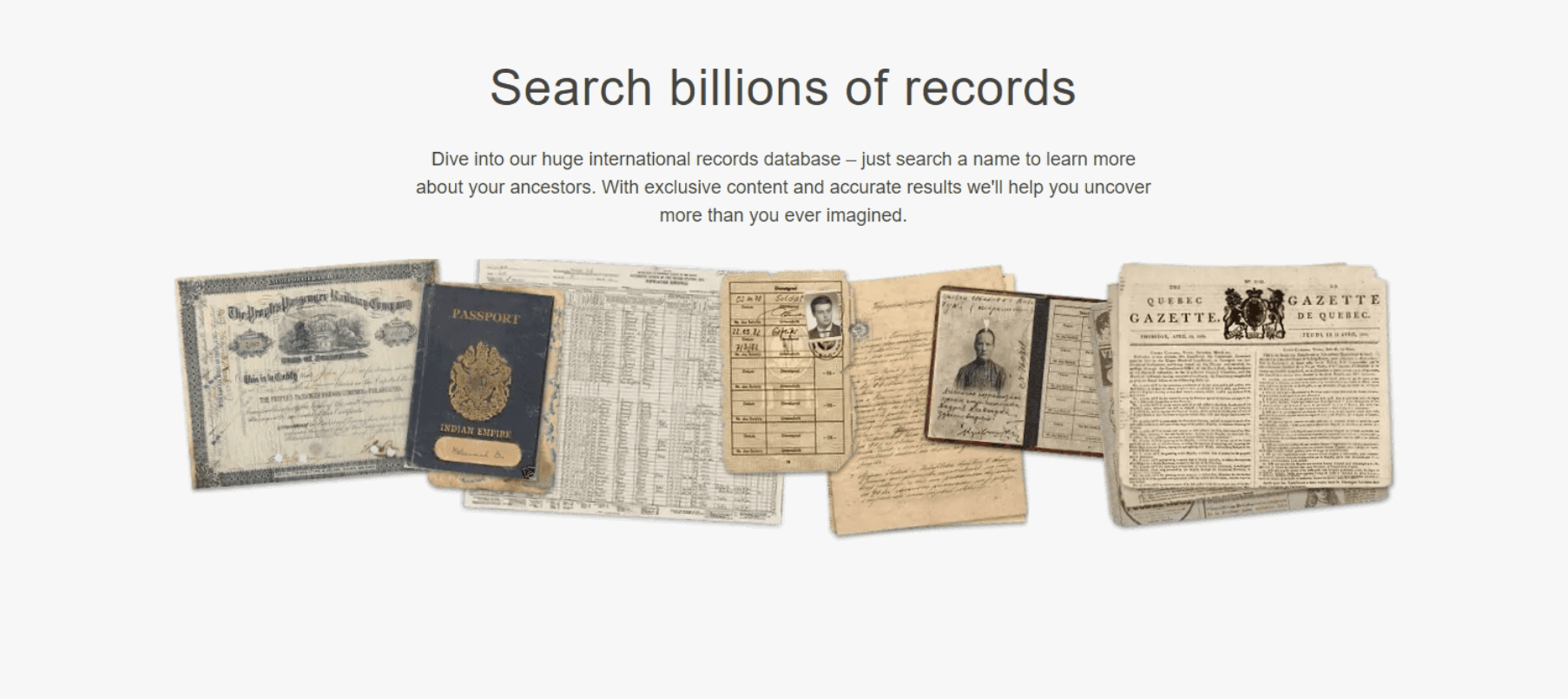
Source: MyHeritage
If you’re looking for a service profile similar to Ancestry.com, MyHeritage is worth checking out. The company has a decent database of more than 8 million DNA records mapped across 2,100 regions. Besides offering estimates about your ethnic background, the platform can also help you:
Discover relative matches from its database
Build your family tree
Upload and browse historical records
Get alerts for new discoveries
MyHeritage’s reports are not the most accurate or detailed, likely due to its limited genotyping technique and smaller database. Still, many users find MyHeritage more suitable for outlining ancestry outside the U.S., especially the European line.
Plus, the platform has a clean and easy-to-navigate interface, which is why many users prefer it for record-keeping, even if they’ve opted to analyze their DNA elsewhere. Here’s what one user shared about their experience:
“I vastly prefer MH over Ancestry in almost every way other than it having fewer people tested and not as many genealogical records. But it’s far easier to use, easier to visualize and navigate, they don’t add features and then charge more for them, and their tools are great.”
Bonus read: Check out our detailed comparison of MyHeritage and 23andMe.
MyHeritage pricing*
DNA kit: $89
DNA kit + Complete 1-year platform access: $183
Free trial
*Excluding shipping
MyHeritage pros and cons
3. FamilyTreeDNA
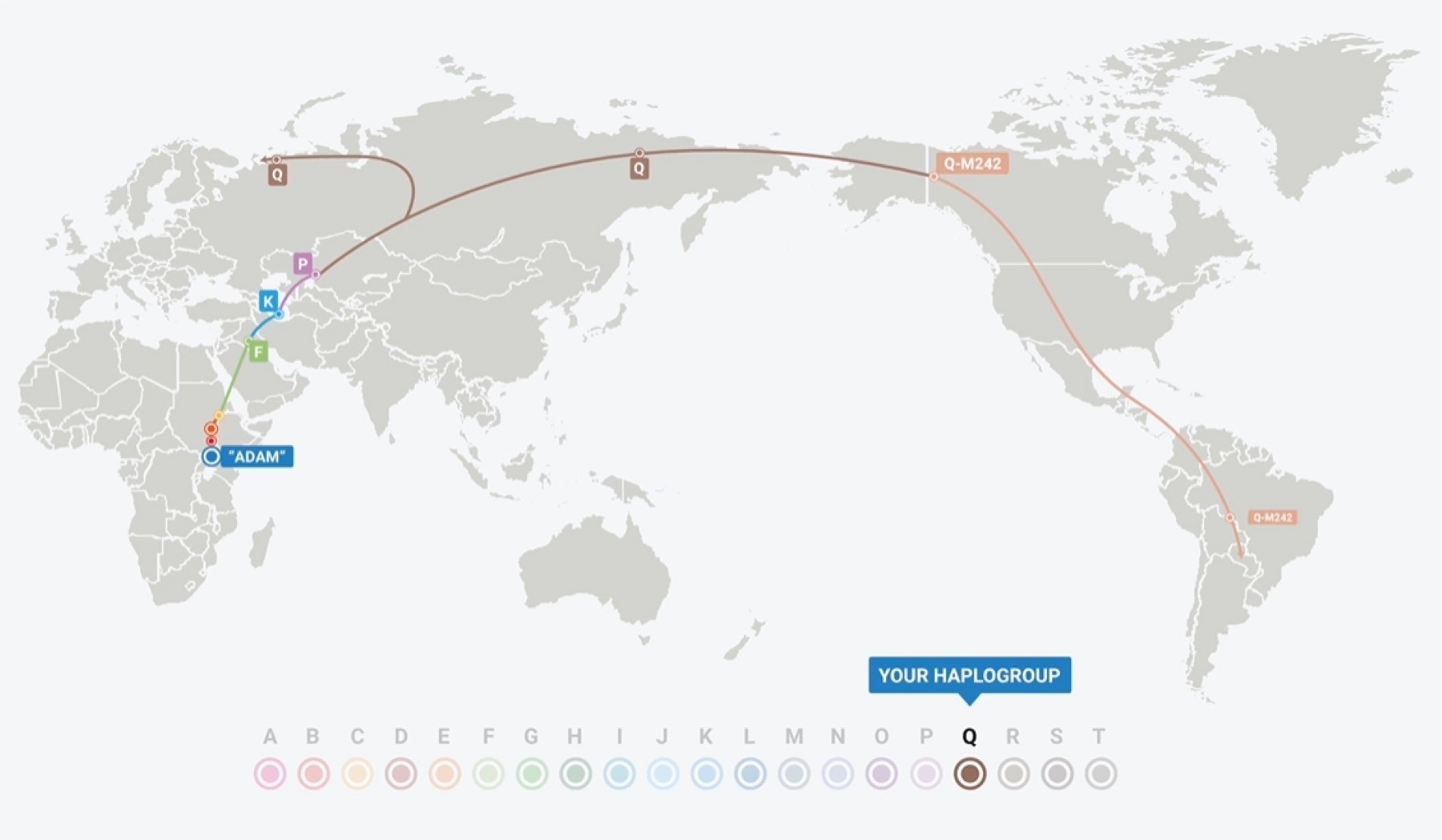
Source: FamilyTreeDNA
FamilyTreeDNA is a less expensive alternative to Ancestry.com. It offers many pricing options to cater to different customer needs and budgets, but you can get a basic test for as low as $49.
With FamilyTreeDNA, you can learn about your ancestry from as far as five generations ago. Its DNA analysis service can help you trace your matrilineal and patrilineal lines (haplogroups) and connect with relatives from the database. Tip: It’s best to bundle haplogroup and family ancestry tests for a better deal.
While FamilyTreeDNA is a good option if you’re interested in haplogroups, its ancestry results tend to have low accuracy rates and may provide fewer matches. Here’s the experience of one user:
“[FamilyTreeDNA] can be very useful if other relatives in your male line have taken the test. But I don’t feel like their autosomal tests and results are as helpful or useful as Ancestry.”
Note: FamilyTreeDNA’s family tree builder will no longer be available starting September 2024. The platform has asked users to transfer their existing trees to MyHeritage, its new service partner. The partnership has caused a stir among users as they may now have to pay extra for the same functionalities on MyHeritage.
FamilyTreeDNA pricing
Single Tests: $49–399
Bundle Tests: $139–259
FamilyTreeDNA pros and cons
4. CRI Genetics
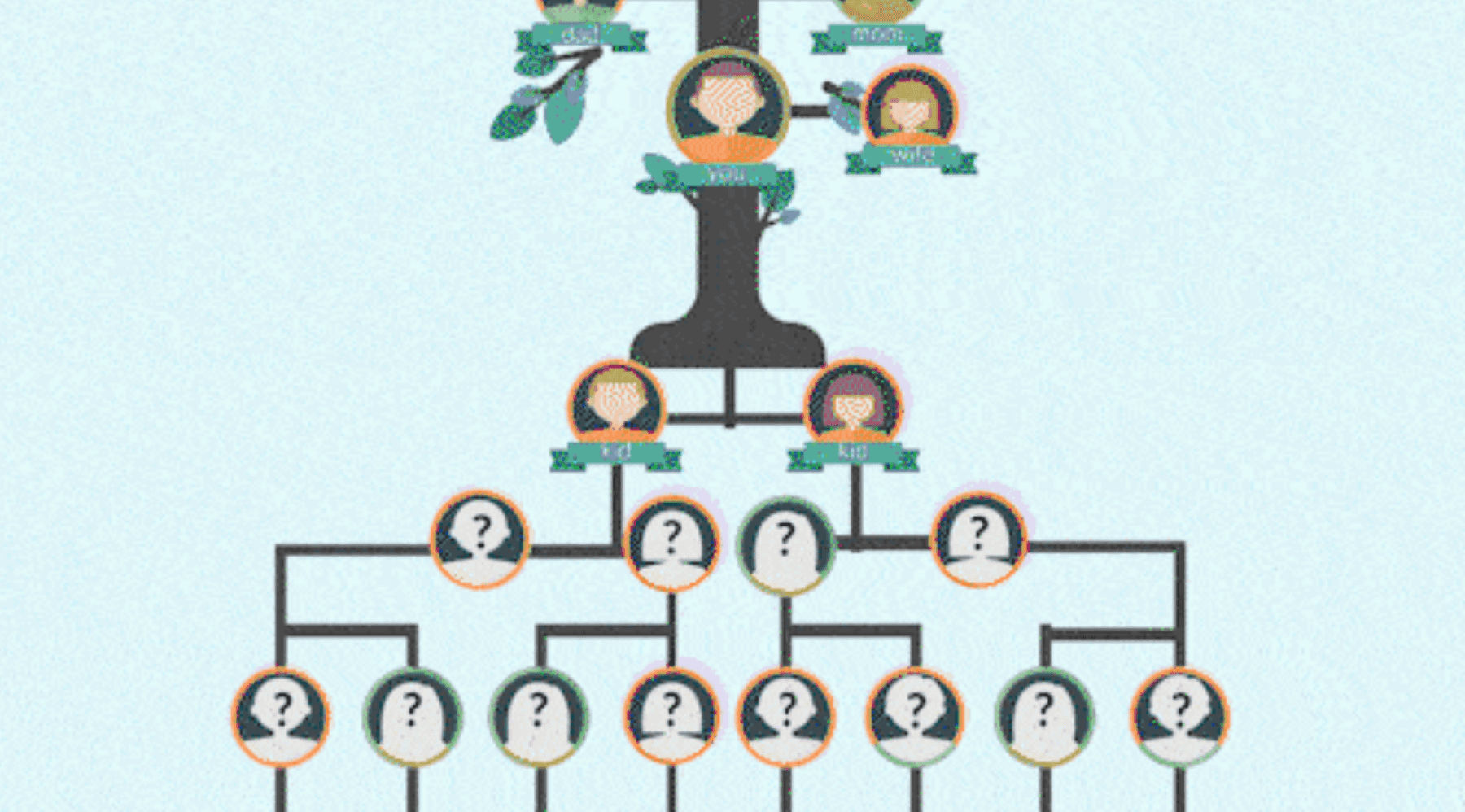
Source: CRI Genetics
CRI, or Cellular Research Institute Genetics, is one of the newer companies on the list. While Ancestry.com was founded in 1996, CRI Genetics was only launched in 2016, but it has quickly gained traction in the industry.
With CRI Genetics, you can get both haplogroup and dual ancestry reports, as well as an advanced timeline report that traces your lineage back up to 50 generations.
The platform also offers analyses on genetic traits and health factors, such as metabolism and allergies — but the testing is genotyping-based and not clinical-grade. Like most platforms on the list, the results are not always precise.
One unique aspect of CRI Genetics is that it offers an efficiency guarantee. If your results don’t arrive in eight weeks, the company will refund you.
Bonus read: Check out how CRI Genetics stacks up against 23andMe.
CRI Genetics pricing
Ancestry + Traits: $89
Health + Ancestry: $109
Note that these pricing tiers don’t unlock all available reports — you need to purchase add-ons to access some information.
CRI Genetics pros and cons
5. Living DNA
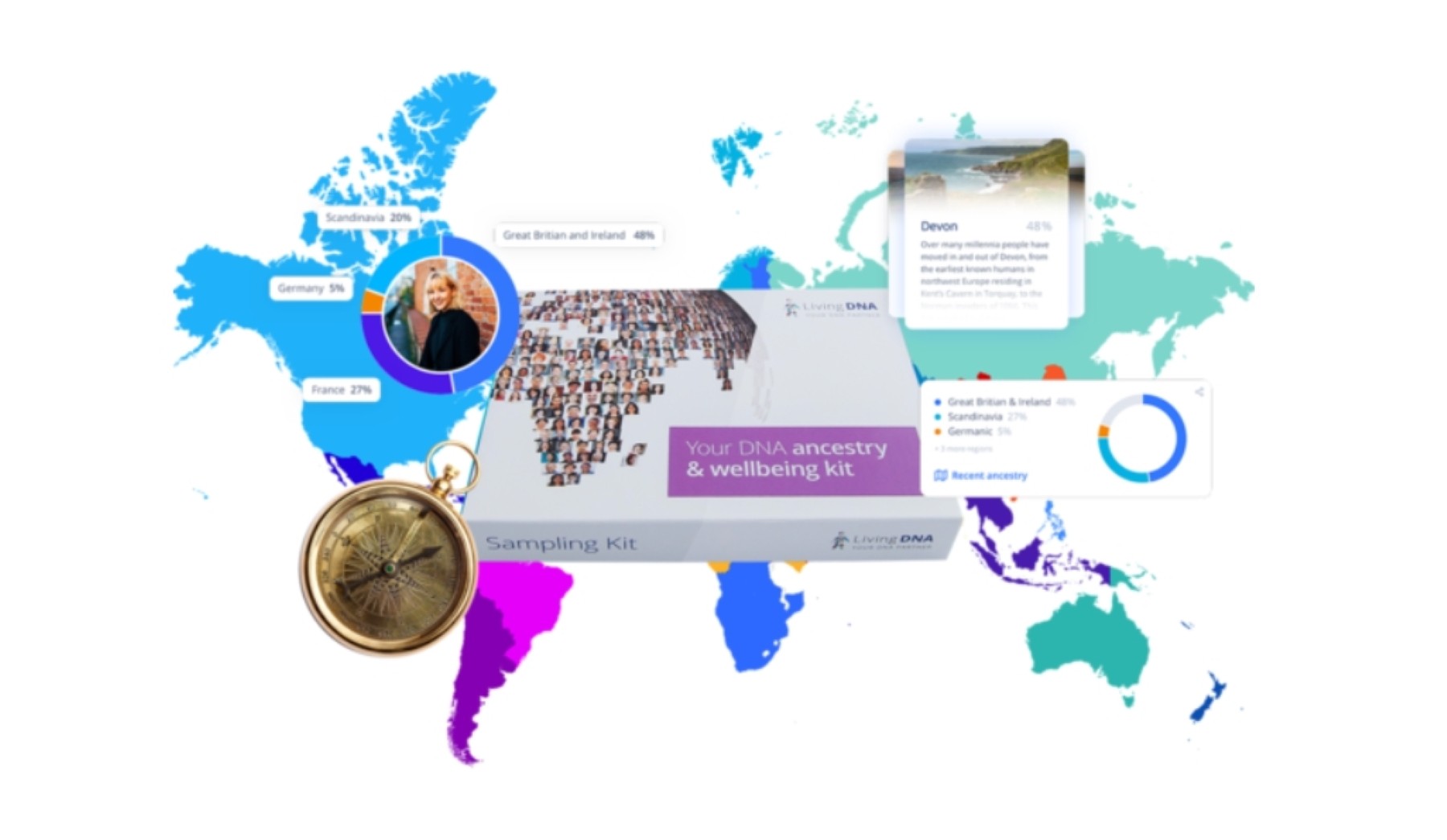
Source: Living DNA
Living DNA claims to provide the most detailed ancestry test in the world, but you have to take the statement with a grain of salt. The platform offers regional ancestry breakdowns, with eight times the precision for the British Isles than other services.
Living DNA can also reveal your haplogroups and DNA matches so you can expand your family tree. Its more expensive pricing tier includes well-being reports, which offer science-backed recommendations to improve your nutrition and exercise performance.
Where Living DNA stands out the most is customer service. It has numerous positive reviews, many of which praise the responsiveness and generosity of the company’s representatives.
Unfortunately, the platform’s biggest issue is its limited database. While competitors have millions of records, Living DNA has only 300,000, so you can expect fewer matches and less reliable results.
Living DNA pricing*
Ancestry kit: $90
Wellbeing kit: $112
Wellbeing and ancestry kit: $188
*Excluding shipping
Living DNA pros and cons
Final verdict: what’s the best alternative to Ancestry.com?
When it comes to ancestry and ethnicity information, your ultimate choice depends on what you prioritize. For instance, if you value accuracy in geographical groupings or more relative matches, it’ll make sense to go for services with a large reference population.
Platforms with smaller databases also have their merits — they tend to be quick to add new analyses that enable better self-discovery. For health-related analyses, though, none of the services we discussed provide trustworthy results.
Why?
The truth is that most direct-to-consumer DNA health tests use outdated genotyping to analyze genetic variants (DNA differences) for only a fraction of your DNA. You never get a clear picture of how your DNA impacts your health profile. That’s why many industry leaders, including Harvard Health, caution against relying too much on services like Ancestry.com and 23andMe.
If you truly value self-discovery and health optimization through next-generation genetic testing, you should choose Nucleus — an all-in-one DNA health test.
Nucleus goes beyond the limitations of genotyping to offer whole-genome sequencing (WGS) DNA tests. WGS analyzes nearly 100% of your DNA to pinpoint the most important variants for your unique traits, triggers health predispositions, or impacts your and your kids’ health.
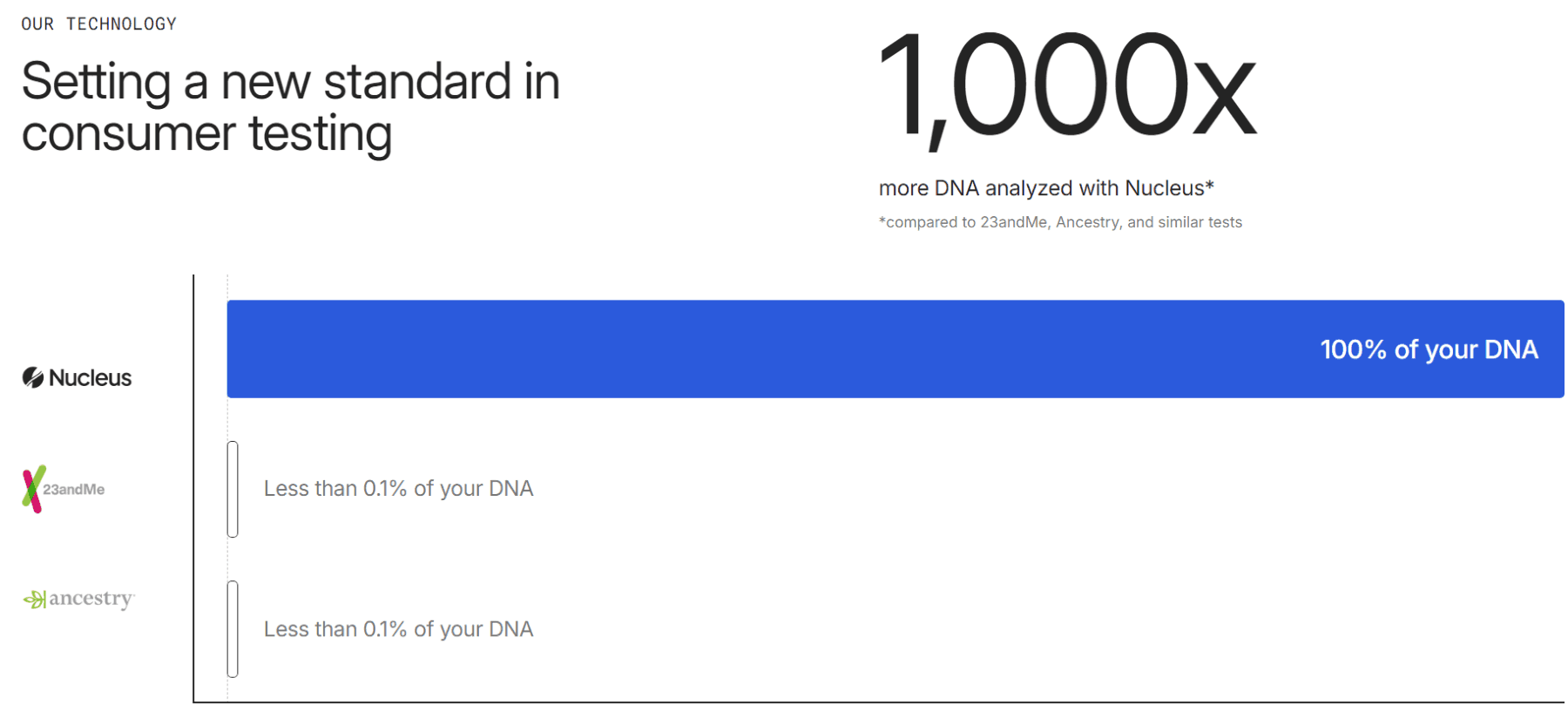
Source: Nucleus
Discover life-changing personal and health insights with Nucleus
Building family trees and finding relative matches may seem like a cool use of genetic testing, but there’s so much more you can gain from this technology today.
With Nucleus, you can get access to clinical-grade, physician-ordered DNA analyses that leverage advanced WGS technology to analyze 100% of your genome. That’s not all — Nucleus also considers lifestyle factors and opinions of genetic counselors to give you comprehensive health and trait reports.
Nucleus’ advanced algorithms generate common genetic scores for numerous diseases, such as rare cancers and heart and nervous system conditions, to shape your personal care. The platform can also detect rare or high-effect genetic variants that other DNA tests often leave out.
With a simple at-home test, you can access comprehensive reports on:
Predispositions for various conditions related to:
General health
Mental health
Focus and energy
Food and diet
Traits, like BMI, male-pattern baldness, height, and muscle strength.
Carrier status for inheritable conditions (coming soon!)
IQ analysis
Bonus: Nucleus partners with SteadyMD to connect you with genetic counselors who can review your reports and recommend proactive steps to improve your longevity and quality of life. Order your at-home test kit today to access these benefits!
Know that Nucleus is a fully regulated, HIPAA-compliant platform. It processes all samples in the U.S. at CLIA-certified and CAP-accredited laboratories to ensure secure, high-quality results.
How to get started with Nucleus
You can begin your journey of self-discovery by ordering Nucleus Premium. Here’s what you need to do:
Add your personal details
Order your kit
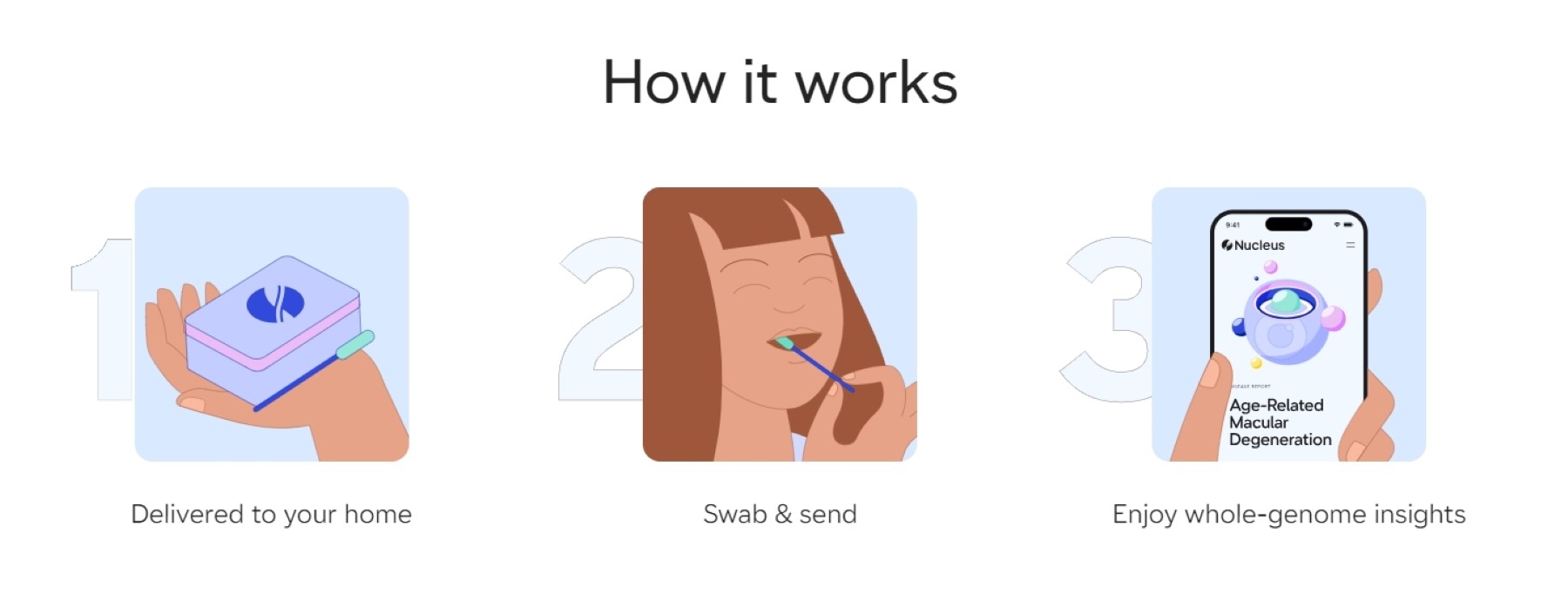
Source: Nucleus
Once you return your DNA sample to Nucleus, you can typically access the results within four weeks. The Nucleus Premium kit will cost you [PRICE.KIT_SOLO.ONE] and give you access to two dozen analyses. This is one of the most affordable whole-genome sequencing tests on the market — similar tests often set you back by thousands of dollars.
You may also like…
Here are some other DNA testing service guides that may be useful to you:
Featured image source: August de Richelieu











